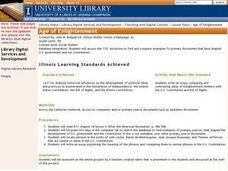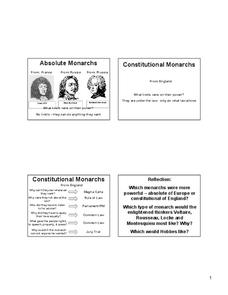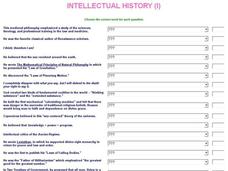Curated OER
Why Do Governments Exist? Locke, Hobbes, Montesquieu, and Rousseau
Here is a great secondary source reading that includes the primary ideas and philosophies of the famed Enlightenment philosophers: Thomas Hobbes, John Locke, Charles Montesquieu, and Jean-Jacques Rousseau. In additional to discussing...
Curated OER
Quotes by Hobbes, Locke, Montesquieu, Rousseau, and Voltaire
In Enlightenment quotations study guide worksheet, students read quotations and identify the speakers as Hobbes, Locke, Montesquieu, Rousseau, Peter the Great, Copernicus, Louis XIV, Galileo, Harvey, Kepler , Frederick the Great, or...
Curated OER
People of the Enlightenment -1600s & 1700s
In this people of the Enlightenment study guide worksheet, young scholars read the notes provided regarding Locke, Hobbes, Rousseau, Montesquieu, and Voltaire.
Curated OER
Four Enlightenment Thinkers
High schoolers examine lives, philosophies, and political beliefs of four Enlightenment Thinkers: Baron de Montesquieu, Jean-Jacques Rousseau, Thomas Hobbes, and John Locke. Students then work with partner to write short speech from...
Curated OER
The Enlightenment in Europe: Ch 22
Why study European Enlightenment? Because our governing forefathers and constitution were shaped by their words and philosophies. Presented here are facts and achievements of 8 different figures from the enlightened era. Also included is...
Curated OER
Unit 12: Enlightenment and French Revolution
In this Enlightenment lesson, students respond to 34 short answer questions about John Locke, Thomas Hobbes, Baron de Montesquieu, Jean Jacques Rousseau, Voltaire, Denis Diderot, and Mary Wollstonecraft.
Curated OER
Philantrophy of the Founding Fathers -- Alive and Well Today
Students discuss the role that individuals have in contributing to society. They develop alternative solutions to problems in their area. They write a paper about what they have discovered.
Curated OER
Absolute Monarchs and Constitutional Monarchs
For this absolute monarchs and constitutional monarchs study guide worksheet, students respond to 15 short answer and fill in the blank questions.
Curated OER
A Rising People: Ben Franklin and the Americans
Students examine the Enlightenment Era and its philosophies, including philosophers. Students gain an understanding concerning what they new science was and what it led to through a series of lessons and a PowerPoint. the end by writing...
Curated OER
Age of Enlightenment
Studnets compare example of primary documents that have shaped U.S. government and our Constitution.
Curated OER
Absolute Monarchs and Constitutional Monarchs
In this absolute monarchs and constitutional monarchs study guide worksheet, students read a brief overview pertaining to the topic and then respond to a reflection question.
Curated OER
Intellectual History
In this online interactive world history worksheet, students answer 22 matching questions regarding the Enlightenment. Students may submit their answers to be scored.
Curated OER
The Enlightenment
For this online interactive world history worksheet, learners answer 20 fill in the blank questions regarding the Enlightenment. Students may submit their answers to be scored.
Curated OER
The Glorious Revolution, the American Revolution, and the French Revolution
Students relate the Glorious Revolution, the American Revolution, and the French Revolution through web based research and scenarios.
Curated OER
Democratic Revolutions
Students study the Age of Revolutions. In this Latin America lesson, students consider how democratic revolutions around the world led to imperialism in Latin America.
















